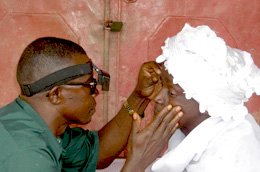Project Challenges
END in Africa Project Challenges
In September 2010, the United States Agency for International Development (USAID) awarded FHI 360 two five-year Regional Cooperative Agreements for the END in Africa and END in Asia projects, marking the beginning of track two of USAID’s NTD control program. Although the END in Asia project closed in 2015, the END in Africa project subsequently received a 3-year extension, running through September 2018.
The END in Africa project supports national health ministries and other government entities in West Africa as they scale up their local integrated NTD control activities. As the countries make progress in eliminating these diseases, the END in Africa project supports them in ongoing disease surveillance and in activities to help ensure the diseases will not return.
As the primary partner for the END in Africa project, FHI 360 provides overall program and financial management, coordination, and quality control. Its partners provide capacity building in financial management, drug forecasting and supply chain management, program monitoring and evaluation, and knowledge management. FHI 360 has also engaged several sub-grantees to assist the countries in coordinating local project activities.
FHI 360 and its partners have close relationships with governments and nongovernmental organizations in West Africa, a wealth of experience developing global and country-level infrastructure, and the staff and systems to ensure smooth delivery of effective preventive chemotherapy and support activities for NTDs. The FHI 360-led team’s strategic and technical approach capitalizes on each partner’s strengths and emphasizes country ownership, collaboration, transparency, accountability, and sustainability.
Key Project Elements
- Increasing country ownership by ensuring active government participation in the grant process, improving communication with government stakeholders, and closely targeting resources to support MOHs as they integrate disease control and the delivery of preventive chemotherapy into national strategic plans.
- Supporting the integration of vertical NTD control programs through the co-management of diseases to increase cost efficiencies, treat more individuals and improve program sustainability.
- Fostering collaboration among a wide range of stakeholders—brought together through effective Intra-Country Coordinating Committees (ICCCs)—to strengthen integration, achieve cost efficiencies, and maximize the impact of resources.
- Ensuring transparency and accountability through grant-making and management built on clearly defined roles and responsibilities, transparent systems, processes and procedures, open communication, and the regular sharing of data, results, and lessons learned.
Building long-term sustainability by working with MOHs, Neglected Tropical Disease Control Programs (NTDCPs) and other country-level entities and programs in a way that strengthens national systems and capacity to deliver integrated programming.
END in Africa Countries:
Burkina Faso, Ghana, Niger, Sierra Leone, Togo

Photo Credit: Helen Keller International

